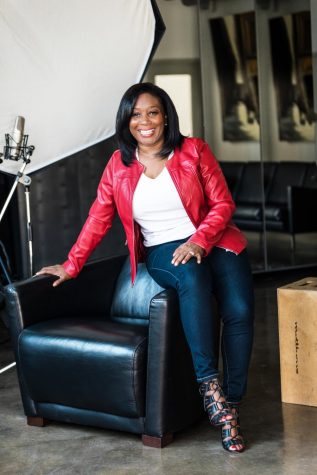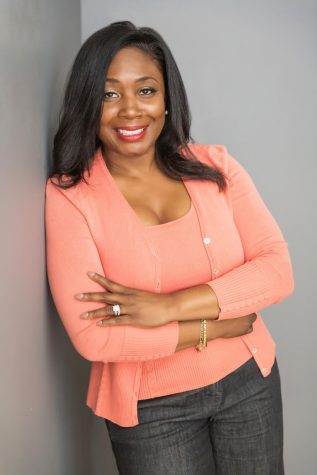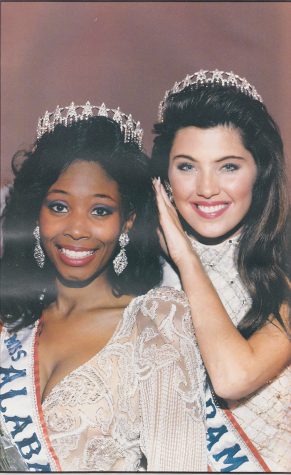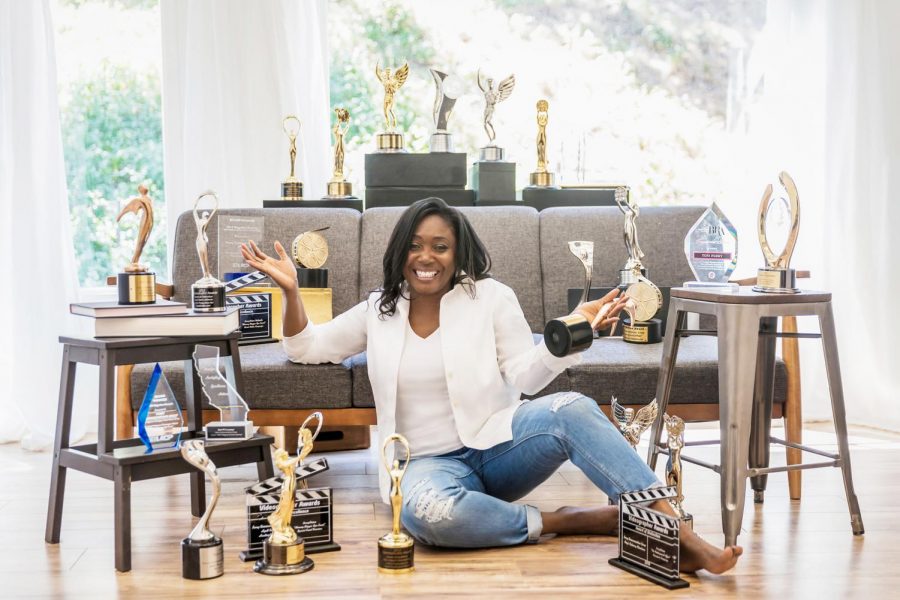Johnson-Purry made history in Alabama
Former state queen opens up about her journey in public relations and becoming an author
Toni enjoys the awards received during her years of running her own public relations firm, Purry Communications, in Los Angeles, Calif.
March 6, 2021
Many people in the general public are unaware that there are two major pageant systems for young women in America. There is the Miss America Pageant, which was established in 1921 and the Miss USA Pageant, which was established in 1952, both having their respective preliminary pageants for each state. Both pageants are nationally televised each year.
In 1988, Alabama State University hosted its first preliminary to the Miss Alabama/America Pageant titled the Miss Hornet Scholarship Pageant that could eventually land a young woman from Alabama State University to Atlantic City, New Jersey to compete for the Miss America crown.

In 1991, former student Toni Johnson-Purry earned the title of Miss Hornet and placed as a Top Ten Finalist at the Miss Alabama/America Pageant in Birmingham, Ala. A year and a half later, she became the first African American woman to win the title of Miss Alabama USA, breaking a 40-year history of discrimination against women of color in Alabama’s pageant world.
Proud of her victory, Johnson-Purry knew it could not have been done without the love, training, and support granted by the ASU community.
“My time at ASU was so rich,” she said. “I had an incredible village of people that encouraged, supported, and stood behind me.”
Though she was born in Natchez, Miss., Johnson-Purry was brought up in the busy city of Boston, Mass. Growing up in a family of four, her parents exposed her to many forms of entertainment and pastimes, resulting in her dabbling in many hobbies. While at Brockton High School, Purry ran track, did gymnastics, participated in theatre, and enjoyed traveling and appreciating other cultures.
“I was fascinated by other cultures, the food, and the lifestyles,” Johnson-Purry said. “On the weekends, we would always go and try new ethnic foods and travel.” While in Boston, she also enjoyed viewing the arts. “We would go to plays often. I always loved that,” she shares, with her first Broadway play being ‘The Wiz.’
When she was 15, Johnson-Purry’s family relocated to Montgomery, Ala.
“My parents really missed living in the South,” she says.
Along with the move, her family dynamic also changed as her parents went through a divorce. Now transferring to Jefferson Davis Sr. High School, she was faced with the challenge of adjusting to her new reality.
Upon her graduation in 1985, Purry decided to enter the workforce rather than immediately enrolling in college.
“I got my first job out of high school at an ice cream shop and moved up to a manager position pretty early on,” she said.
Along with this job, she also went on to get a job at a private fitness club, working with its VIP members. After three years of working, making her own money, and living independently, Purry decided that it was time to start her collegiate journey.
“After working in managerial positions,” Johnson-Purry said, “I kind of just hit this point where I thought, ‘Okay, I am ready to go to college now.’”
She decided to attend Alabama State University because it was close to home and because her stepfather, Richard Nelson, was a proud alumnus who spoke highly of the university.
“He is the one that took me to my first Turkey Day Classic before I even started going to school there,” she said. Alabama State was a regular name in the household.”
Also excited for her journey as a Hornet, her biological father, Freddie Johnson, agreed to cover her tuition. While she was still working, Purry enrolled as a part-time student in 1989.
She joined the Hornet’s Nest as a broadcast journalism major. While she was inspired by the well-known Atlanta, Ga. anchor Monica Kauffman, Purry had dreams of becoming a news anchor. Though she excelled in her classes, her zeal and ambition would not allow her to sit through events or assignments that failed to interest her. She appreciates David Okeowo, Ph.D., retired chairman of the Department of Communications, working with her through her struggles.
“Whenever there was an assignment that I did not want to do, like covering boring things, I would go to him and say, ‘Dr. Okweowo, can I please write a paper? Can I do another project? I will do anything, but please do not make me do this.’” He would hear her troubles and sometimes allow her to substitute an assignment, and she would knock it out of the park every single time.
Considering she did not like to color inside the lines, Okeowo convinced Johnson-Purry to change her major to public relations, as the field would allow her to pursue a career in reporting but would also grant a little more creative freedom. She cherishes the confidence and professional advice he gave.
He said, “Knowing you, you will find a way into the news industry if that is what you really want to do.”
While a student, she participated in the theatre department, joined a dance troupe, and served as a public relations director for student media. Considering she juggled so many extracurriculars and met so many people, Johnson-Purry’s favorite memories of ASU are all of the events that exemplified teamwork, camaraderie, and community.
“I was very much a nontraditional student, not just because I was older but also what I did while I was there. Some semesters I was all in, some semesters I was only taking one or two courses,” she says. “It was a different collegiate experience for me, but it was phenomenal because I always felt important.”
She fondly remembers her geography instructor, David Iyegha, Ph.D., who took the time to work with her and keep her head on straight as she was training for the Miss Alabama Pageant. During those times, she would keep up with assignments and lessons but often missed classes due to traveling and training. However, she maintained excellent chapter test grades but missed three map tests, and because of that, she was on the road to failing the class.
One day while in class, Dr. Iyegha called her out in front of all of her classmates, saying, “If you were my daughter, I would spank your butt!” Back then university professors would give students brutal honesty and tough love that allowed Johnson-Purry to stay humble during her reign.

“He was not trying to shame me,” she reassures, “he was trying to speak to me in a way that I would get it. It was out of love and true concern.”
Before attending ASU, Purry had no history or interest in pageantry. Her curiosity in the industry was sparked upon finding out that the titleholder for the Miss Hornet Scholarship Pageant received three semesters of paid tuition. She found the scholarship quite attractive and decided to enter the competition.
“I thought, ‘How hard could it be?’ I would just get a swimsuit, answer a few questions, put on a gown, and then get the three semesters,” Johnson Purry originally thought.
As she attended informationals, Purry learned that the Miss Hornet Scholarship Pageant winner automatically advances to the Miss Alabama America Pageant and was troubled by the fact that Miss Alabama had never had an African American winner. In her ambitious and trailblazing nature, she decided that she wanted to be the first.
“Now my desire to win Miss Hornet was a formality so I could win Miss Alabama and level out the playing field for all women in Alabama,” she said
As she planned, Johnson-Purry won the Miss Hornet’s title in 1991 and had only eight weeks to prepare for the Miss Alabama/America Pageant. To prepare for the competition, she studied current events, political issues, social issues, economic concerns, history of the pageant, the mission of the pageant, past winners of the pageant, and perfected her talent which was 40 percent of the competitition – a monologue from “For Colored Girls Who Have Considered Suicide When the Rainbow Is Enuf” by Ntozake Shange. She began working out with a trainer and conducted mock interviews with various university faculty members.
“Before my win, Miss Hornet had never placed in the Miss Alabama/America Pageant, but I was determined to go there and win.”
Though she did make the Top 10 finalists, Johnson-Purry was distraught as she did not win the 1991 Miss Alabama/America Pageant. Refusing to be broken, she went on to compete in eight other preliminary pageants around the state of Alabama to compete for the Miss Alabama crown in 1992.
She continued to take classes while participating in pageants, and while the ASU community supported her efforts, they also provided a realistic perspective to balance out her elaborate dreams.
“They would say, ‘Girl, just focus on your academics because Alabama is not going to have a black winner.’” But Purry’s ambition to win the title of Miss Alabama would not be deterred. However, reflecting on their words, Purry can appreciate their advice. She said, “They were not dream killers, just realists.”
After competing in seven preliminary pageants and placing first runner-up in many of them, Purry began to get discouraged. As she was readying to pass down her Miss Hornet crown, she met Debbye Turner, the 1990 Miss America who encouraged her to keep competing until she hit her goal of Miss Alabama. Turner, who had placed first-runner up to Miss Arkansas twice, finally went on to win the 1989 Miss Missouri crown, before being crowned Miss America 1990.
Purry took the advice and decided to compete in just one more preliminary pageant and won. In 1992, Purry competed in her second Miss Alabama America Pageant.
“I was doing mock interviews all year, I was training all year, I was practicing my talent all year. I was ready.” Though she placed in the Top 10 finalists again, she made history by being the first African American to win the preliminary swimsuit competition, and she won Miss Congeniality. Her defeat caused a rift within the Alabama pageant community as many people felt that she should have placed much higher.
The Miss Alabama USA pageant representatives soon reached out to Purry, encouraging her to compete in their pageant, as they required a strong application rather than a preliminary victory. But despite her supporters’ efforts, Purry made the decision to leave the world of pageantry.
“My mom sat me down and tried to convince me, and I told her to stop asking because I was not doing it, Alabama was not ready for a black winner and I am not going to waste my time any longer.”
However, two days before the Miss Alabama USA Pageant, she was convinced by a well-known pageant coach, Randall Smith, to compete but she feared it was too late since she had not made application or paid the fee.
She contacted the Miss Alabama USA organizers to find out whether she could participate, only to learn that her mother and advisor had already sent in an application and registered her for the contest. According to Johnson-Purry, all of this occurred on a Thursday, and the pageant was scheduled for the next day.
“I go to the pageant the next day for the preliminary competition,” Johnson-Purry said, “I pull out my old dress, my old swimsuit, and all the stuff. I had not done any special preparation, really completely unprepared.”
However, during the two-day pageant, there were times when I said to myself, “Why did I allow them to talk me into doing this again?” By the time I said that, they were calling my name to be in the Top 12, 15 minutes later, they were calling my name for the Top Six. That is when I said, “I could possibly win this.” In usual Purry fashion, her confidence, intelligence, and beauty did all the work for her.
“On October 31, 1992, the day of the Magic City Classic football game, I became Miss Alabama USA, breaking a 40-year glass ceiling!” she said emotionally. “I was so shocked. I could not believe it.” She had fulfilled her dreams of becoming the first African American woman to hold a Miss Alabama USA title. Though she earned the crown, she felt that she had won for the ASU community, for the student media team that helped her along the way, and for all the African American women in the South.
She competed in the Miss USA Pageant in Witchita, Kansas that year, where she met Miss Michigan 1992 Kenya Moore, who is better known today at one of Real Housewives of Atlanta. Moore went on to win the crown, but Johnson-Purry appreciates the experience.
“I was not as heartbroken because my passion was about leveling the playing field in Alabama,” she said.
Purry knows that she would not have persevered and been victorious without her ASU family’s support.
Above all others, she treasures the time, effort, and support she received from Kenneth Dean, the student life coordinator.
“I can not say enough about Mr. Dean,” she said. “He was then, and still now to this day, my mentor.” She exclaims, “I do not know anybody so selfless when it comes to dedicating time to help students be their absolute best.” Not only did he support her work with the student media, but he gave her excellent advice.
After completing her year as Miss Alabama USA, Purry entered the workforce at an early age and worked throughout her college years, she received a unique job offer while still enrolled as a student. She accepted a full-time job as an audience development coordinator for the Alabama Shakespeare Festival, where she was responsible for diversifying the theatre to attract more minority viewers. She stayed in this position for about three years and then transitioned into a similar role as the market development director in the Chamber of Commerce’s tourism section.

“Back then, diversity and inclusion was such a big thing, so that was what my work was focused on,” Johnson-Purry said.
She worked for the Department of Labor for Job Corps as the regional director of national corporate development, where she introduced the students as resources to significant companies.
Looking for a change in scenery, Purry moved to Los Angeles, Calif., where she worked as an independent publicist for big-name businesses, her first client being Attorney Jock Smith, a nationally recognized attorney and a Cochran Law partner.
“That was such a huge opportunity for me,” she said. The relationship established with The Cochran Firm opened doors to more corporate-level clients.
Purry then worked at a public relations agency in the Los Angeles area, where she eventually was promoted to vice president. Her enterprising nature would not allow her to rest, as she dreamed of starting her own public relations agency.
“I was able to learn from that agency, and from there, I launched my own,” Johnson-Purry said.
She began Purry Communications Agency in 2007.
“We started in the middle of the recession,” she says comically, “but soared in spite of it.”
Specializing with high-end hospitality clients, Purry worked primarily with luxury hotels, destination sites, state-of-the-art shopping centers, airports, and more. Though the business won over 50 awards, she grew tired of the agency life and ceased Purry Communications Agency in 2017.
Considering she no longer had a drive for public relations, Purry hit a rut as she did not know what path to take next.
“My confidence took a hit. I knew I did not want to do agency life anymore, but I did not know what I wanted to do next,” she says. “I felt like a loser because I did not know how to give myself permission to pivot.”
She soon found inspiration from a documentary about one of the world’s greatest athletes, “What’s My Name: Muhammad Ali” (2019), in awe of the way Ali’s confidence never wavered in times of adversity. She noted the role of Ali’s hype man, Bundini Brown, thinking, “Well, if we all had a hype man reminding us of our successes, we would be that confident too!”
That thought birthed Purry’s next venture as an author of a motivational and interactive journal titled “My Hype Book” (2020). Now, too, fulfilled with her work, she enjoys her role of helping and inspiring others who might be going through the same mental struggles that plagued her before.
“I work with people, helping them to find their confidence and also step in the spotlight of their success,” she said.
Johnson-Purry’s journey has been a series of ups and downs, but she knows that that results in an exciting and purposeful life. Throughout the years, she believes that her biggest challenge was managing her ambitions and patience. She expresses that she often beat herself up when her reality failed to meet her ideal dreams’ expectations.
With over 50 business awards to her name, Toni Johnson-Purry is a public relations veteran turned author whose career spans over two decades. She is known for her unique approach to building brand awareness and consumer confidence as she regularly landed clients on shows like Good Morning America, The Today Show, and in LA Times and USA Today. Toni, herself, has twice graced the pages of O, The Oprah Magazine.
Today, Toni works as a Positioning and Visibility Strategist, guiding individuals through a process of leveraging experience and expertise to raise brand awareness and amplify professional value with visibility. Often found keynote speaking on stages about The Power, Influence & Impact of Confidence, Toni is frequently invited to facilitate personal and professional development workshops, events and retreats for corporate teams, small companies, colleges, ministries, and professional network groups centered around her book entitled, “My Hype Book.”
“I can be my worst enemy and really, really hard on myself,” she explains. “But idealism has been what allowed me to grow, rise, and create opportunity in places where others could not.”
The most rewarding part of her work has been a beacon of light and positivity to others. She says, “I want to be an example of what possibility looks like.” From paving the way for Black pageant girls in Alabama, building businesses with her PR work, and encouraging others through her book, Johnson-Purry has been spreading her gifts to the community for three decades.

“I want to show what a little determination, passion, and fervency can do for you,” she said.
Johnson-Purry is very appreciative of her years as a Hornet and her years in the pageant industry, as the two communities brought out the best parts of herself. While ASU taught her the importance of togetherness, pageantry taught her the importance of a radical.
“[Pageantry] taught me how to insert myself in places where I am not welcome,” she said. “It taught me how to be a disrupter, and I love that. I love that I disrupted that system.”
While remembering her ASU, she shares her memories.
“It gave me an appreciation for who we are as Black people. It gave me a vision, a foundation, security, and strength. ASU will forever be an anchoring season in my life,” she said.
Today, Johnson-Purry resides in Los Angeles, Calif. with her husband, Lester Purry. Considering Purry is an actor, the two met at the Shakespeare Festival where she worked. He proposed on their first date, and they were wed ten months later.
“We have been married for 23 years, and he is still my favorite person in the world,” she said. “He is the steady to my crazy.” Though they have no children, the two spend much of their time with their extended families. Johnson-Purry continues to enjoy her interests in the arts, traveling, and cultural exploration and appreciation.
Purry hopes to give back to the ASU community in any way that she can. In pandemic times, Purry’s best way is to provide words of wisdom to today’s Hornets. To students considering a career in pageantry, she stresses the importance of confidence.
“Go into it knowing who you are, standing on what you know, and realize that you can help others appreciate that too,” she advises.
To students considering a career in public relations, she emphasizes the importance of thick skin.
“It is an exciting field because you can create your own story,” she says. “But you have got to truly love what you do because there will be times of rejection.”
Finally, for all students, she asserts the importance of focus and perseverance.
“As challenging as collegiate life can be,” she said, “recognize that at heart, ASU is the best place that you could be.”








Ronnie Anderson • Mar 21, 2021 at 6:15 am
Excellent article
Steve Myers • Mar 19, 2021 at 7:53 pm
Great piece on a marvelous journey by a wonderful person that could, and should be a beacon of light to those that are seeking a path! I knew Toni, and her father in her early life.
I’m blown away by the writing skills of Ms. Zanders, at such a young age (only a freshman). Thanks for a great read!
Michelle Harvey • Mar 11, 2021 at 6:24 pm
Awesome article! Very enlightening to hear this story about my sister-in-law’s sister.